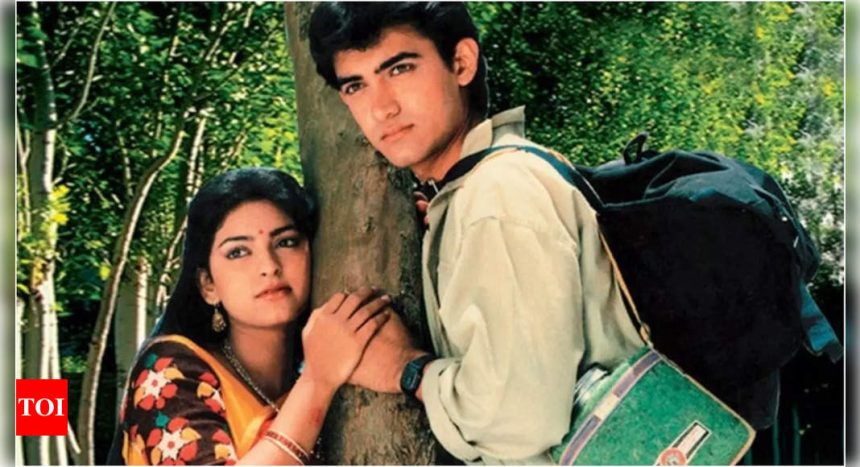In this week’s exclusive Box Office Nostalgia feature, we delve into the financial success of Qayamat Se Qayamat Tak, which introduced two gems – Aamir Khan and Juhi Chawla to Bollywood. This week, we revisit the numbers and impact that made this film a timeless classic.
Film: Qayamat Se Qayamat Tak
Release Date: 29th April 1988
Director: Mansoor Khan
Cast: Aamir Khan and Juhi Chawla
Cost of Production: Rs 1 crore
Business of the film: Rs 5 crore
Qayamat Se Qayamat Tak gave the film industry two of the biggest stars – Aamir Khan and Juhi Chawla, as well as the talented debutant director – Mansoor Khan.It defied the norm of a mushy ending and yet created history to become one of the most popular films ever in the history of Indian cinema.
Describing the film’s magic ingredients, Trade Analyst Komal Nahata said, “The love story, new faces, and music worked for the film. Juhi Chawla’s Sultanat was released, but it did not go well. So, it was like a new and fresh pairing of Aamir Khan and Juhi Chawla. Some distributors told producer Nasir Hussain to change the film’s tragic ending. But Nasir Saab said no. He told my father, a very senior analyst in his days, that he wanted to keep a trial for Film Information. We went to see the film. We wrote a preview that it is ‘a super hit’. Nasir Saab rang up my dad and told me that the same distributors who rejected the film were sending him blank cheques and asking him to give the film to them for distribution. This happened within one day of our preview. Aamir and Juhi were newcomers and they reaffirmed faith in content and music, and the actors only added to the appeal.”
Fresh casting was the biggest USP of Qayamat Se Qayamat Tak
Film historian Dilip Thakur recalled, “When Nasir Hussain’s movies Zabardast and Manzil Manzil flopped, he wanted to retire and give the younger generation a chance. Nasir Hussain’s son, Mansoor Khan, and Tahir Hussain’s son, Aamir Khan, debuted with Qayamat Se Qayamat Tak (QSQT). RD Burman was dropped from Nasir Hussain’s films, and Anand-Milind came on board to compose music for QSQT.’’ He recounted more trivia, ” When the film’s PR asked journalists whom they wanted to interview, the journalists favored Mansoor Khan over Aamir Khan because Mansoor was Nasir Hussain’s son. At the film’s completion party at Centaur Hotel, Aamir Khan came dressed like a college kid. I remember wondering how he would become a star.”
Juhi Chawla had recently become Miss India and starred in a film called Sultanat. There was a trend of putting film stars’ photos on auto rickshaws, but Juhi didn’t see her pictures on autos and asked one auto driver to put up her photo.
QSQT was released at a matinee show at Apsara Theatre in Mumbai. There was a special show for the media at 6 pm for which Aamir Khan had come. He had to find his way to the theatre. There was a young crowd, and the applause the film received indicated that it would be a super hit. The film’s biggest USP was its songs. Music became a superhit, and Aamir Khan became a star. The publicity design posters of QSQT had taglines such as ‘The Boy Next Door’ on them.
The film had fresh faces, the posters’ look was fresh, and the music was fresh. Back then, it was a trend for the hero to always play a guitar if the film was a love story. The guitar was Nasir Hussain’s favorite tool which actor Tariq also played in Yaadon Ki Baarat and Hum Kisise Kum Naheen.
A tragic end of love: Aamir Khan and Juhi Chawla shot for an alternate happy ending for ‘Qayamat Se Qayamat Tak’
QSQT was a love story with a sad ending many years after Ek Duje Ke Liye. Dalip Tahil, the hot-tempered uncle in QSQT and the cause of the family feud, called it a game-changer. “For me, it was a complete game-changer in the good sense of the phrase. But more importantly, it changed the dynamics in the film industry. First, it gave the industry a proper, romantic young man as a lead after a long time. After Rajesh Khanna, Aamir’s entry as the romantic lead was a huge game-changer. Qayamat Se Qayamat Tak was released when Amitabh Bachchan alone was ‘the’ film industry. People used to say from 1 to 10, it’s Bachchan. And we all know the movies that he was making and was succeeding. In that milieu, a film like Qayamat Se Qayamat Tak, a tragic romance but a romance nonetheless, sweeps the audience off its feet. It was unprecedented in that era. It was a massive game-changer for the film industry because a new hero had arrived, who made romance trendy again.”
“New stories were being written now for heroes like Aamir Khan, and romantic elements entered storytelling. Sooraj Barjatya’s films began to resonate soon after. Salman Khan appeared on the horizon shortly after that, and his romantic films started doing well, too, and finally, Shah Rukh as well, in a way. It was the emergence of the new era of romance. So, in that sense, Aamir and Qayamat Se Qayamat Tak are landmarks. This new mood for romance significantly boosted the fatigued music industry, and melody suddenly became the buzzword in music circles. These romantic songs had more staying power, and many are still being listened to. New music directors and singers entered the foray, revitalizing the music scene,” opined Dalip.
Before Aamir and Juhi stepped in, Qayamat Se Qayamat Tak was to be helmed by Nasir Hussain with Shammi Kapoor and Sanjeev Kumar playing the two fathers. “Then he had some medical issues with his health, and he gave the movie to Mansoor, his son. The cast Mansoor managed to collate consisted of lesser-known artists. So, from the funding point of view, Nasir Saab funded this movie himself. Consequently, there was a lot of pressure. I distinctly remember that Nasir Saab held two shows every day for one month in Ketnav (a private theatre in Bandra that is now broken down). I think he invited all the distributors and all the people from the film industry. Everybody who saw the film liked it but didn’t want to buy it because nobody had the guts or the vision to think a romantic film would work. I saw the movie at least a dozen times in those trials. And I also took over one or two distributors I knew then to come and see the film. They loved the movie,” shared Dalip Tahil.’
Describing the disagreements over the ending, Dalip Tahil said, “We shot the ending of the movie in Kolar, Bangalore, where the leads would die. The distributors in those days told Nasir saab that it was a small movie with an unknown star cast, and on top of that, it had such a sad ending that it would not work. That made Nasir Saab a bit nervous, so he told Mansoor to shoot a happy ending. Mansoor told him quite categorically, “I’ll go and shoot it because you’re my father, and you’re telling me to do it.” We went back to where the ending was, and we shot it.”
“I remember Mansoor sitting far away on a chair reading a magazine, and Aamir was controlling everything, and we shot it ourselves. You know what I mean? Mansoor was just detached. And he told his father, also. He said, “If you put the happy ending, please take my name off this film.” And this is Mansoor’s first film. But his conviction bound him, and he was so bound by what he wanted the ending to be like. Now, Nasir Saab was in a dilemma, stuck between what his son and the distributors were saying. So, his confidence was also not where it was in the days when he shot all his lovely movies and musical films. So, he went to several people and said, What should I do? Finally, he went to Dr. Rahi Masoom Raza, who was considered the Oracle then.
And I remember Rahi Saab coming to see the film. And Rahi Saab told Nasir Saab, “It’s a fabulous movie: happy ending or sad ending. With a happy ending, it will be a successful film. But the sad ending will make it a classic.” And it became a classic. Nasir Saab followed Rahi Saab’s judgment because he said he believed a lot in Rahi Saab. He said, “There’s not anything that I dislike about this film. Everything is wonderful. But look at all the classic love stories. They all have a sad ending.”
And then Nasir Saab decided that whatever happens, I’ll use the sad endings. But no one was buying the film because everybody came, everybody loved the movie. But they needed more time to pay the amount Nasir Saab asked for Bombay. All of India was sold, but Bombay remained to be sold, so Nasir Saab released the film in Bombay territory himself. The film became a super hit.
A commercial success and a cult classic!
Made on a budget of Rs 1 crore, Qayamat Se Qayamat Tak faced hurdles from the shooting to casting and from distribution to the ending. However, when it arrived in theatres on 29 April 1988, it was received with a thunderous applause. The film earned Rs 5 crore at the box office and secured its place as one of Bollywood’s timeless entertainers.
Film: Qayamat Se Qayamat Tak
Release Date: 29th April 1988
Director: Mansoor Khan
Cast: Aamir Khan and Juhi Chawla
Cost of Production: Rs 1 crore
Business of the film: Rs 5 crore
Qayamat Se Qayamat Tak gave the film industry two of the biggest stars – Aamir Khan and Juhi Chawla, as well as the talented debutant director – Mansoor Khan.It defied the norm of a mushy ending and yet created history to become one of the most popular films ever in the history of Indian cinema.
Describing the film’s magic ingredients, Trade Analyst Komal Nahata said, “The love story, new faces, and music worked for the film. Juhi Chawla’s Sultanat was released, but it did not go well. So, it was like a new and fresh pairing of Aamir Khan and Juhi Chawla. Some distributors told producer Nasir Hussain to change the film’s tragic ending. But Nasir Saab said no. He told my father, a very senior analyst in his days, that he wanted to keep a trial for Film Information. We went to see the film. We wrote a preview that it is ‘a super hit’. Nasir Saab rang up my dad and told me that the same distributors who rejected the film were sending him blank cheques and asking him to give the film to them for distribution. This happened within one day of our preview. Aamir and Juhi were newcomers and they reaffirmed faith in content and music, and the actors only added to the appeal.”
Fresh casting was the biggest USP of Qayamat Se Qayamat Tak
Film historian Dilip Thakur recalled, “When Nasir Hussain’s movies Zabardast and Manzil Manzil flopped, he wanted to retire and give the younger generation a chance. Nasir Hussain’s son, Mansoor Khan, and Tahir Hussain’s son, Aamir Khan, debuted with Qayamat Se Qayamat Tak (QSQT). RD Burman was dropped from Nasir Hussain’s films, and Anand-Milind came on board to compose music for QSQT.’’ He recounted more trivia, ” When the film’s PR asked journalists whom they wanted to interview, the journalists favored Mansoor Khan over Aamir Khan because Mansoor was Nasir Hussain’s son. At the film’s completion party at Centaur Hotel, Aamir Khan came dressed like a college kid. I remember wondering how he would become a star.”
Juhi Chawla had recently become Miss India and starred in a film called Sultanat. There was a trend of putting film stars’ photos on auto rickshaws, but Juhi didn’t see her pictures on autos and asked one auto driver to put up her photo.
QSQT was released at a matinee show at Apsara Theatre in Mumbai. There was a special show for the media at 6 pm for which Aamir Khan had come. He had to find his way to the theatre. There was a young crowd, and the applause the film received indicated that it would be a super hit. The film’s biggest USP was its songs. Music became a superhit, and Aamir Khan became a star. The publicity design posters of QSQT had taglines such as ‘The Boy Next Door’ on them.
The film had fresh faces, the posters’ look was fresh, and the music was fresh. Back then, it was a trend for the hero to always play a guitar if the film was a love story. The guitar was Nasir Hussain’s favorite tool which actor Tariq also played in Yaadon Ki Baarat and Hum Kisise Kum Naheen.
A tragic end of love: Aamir Khan and Juhi Chawla shot for an alternate happy ending for ‘Qayamat Se Qayamat Tak’
QSQT was a love story with a sad ending many years after Ek Duje Ke Liye. Dalip Tahil, the hot-tempered uncle in QSQT and the cause of the family feud, called it a game-changer. “For me, it was a complete game-changer in the good sense of the phrase. But more importantly, it changed the dynamics in the film industry. First, it gave the industry a proper, romantic young man as a lead after a long time. After Rajesh Khanna, Aamir’s entry as the romantic lead was a huge game-changer. Qayamat Se Qayamat Tak was released when Amitabh Bachchan alone was ‘the’ film industry. People used to say from 1 to 10, it’s Bachchan. And we all know the movies that he was making and was succeeding. In that milieu, a film like Qayamat Se Qayamat Tak, a tragic romance but a romance nonetheless, sweeps the audience off its feet. It was unprecedented in that era. It was a massive game-changer for the film industry because a new hero had arrived, who made romance trendy again.”
“New stories were being written now for heroes like Aamir Khan, and romantic elements entered storytelling. Sooraj Barjatya’s films began to resonate soon after. Salman Khan appeared on the horizon shortly after that, and his romantic films started doing well, too, and finally, Shah Rukh as well, in a way. It was the emergence of the new era of romance. So, in that sense, Aamir and Qayamat Se Qayamat Tak are landmarks. This new mood for romance significantly boosted the fatigued music industry, and melody suddenly became the buzzword in music circles. These romantic songs had more staying power, and many are still being listened to. New music directors and singers entered the foray, revitalizing the music scene,” opined Dalip.
Before Aamir and Juhi stepped in, Qayamat Se Qayamat Tak was to be helmed by Nasir Hussain with Shammi Kapoor and Sanjeev Kumar playing the two fathers. “Then he had some medical issues with his health, and he gave the movie to Mansoor, his son. The cast Mansoor managed to collate consisted of lesser-known artists. So, from the funding point of view, Nasir Saab funded this movie himself. Consequently, there was a lot of pressure. I distinctly remember that Nasir Saab held two shows every day for one month in Ketnav (a private theatre in Bandra that is now broken down). I think he invited all the distributors and all the people from the film industry. Everybody who saw the film liked it but didn’t want to buy it because nobody had the guts or the vision to think a romantic film would work. I saw the movie at least a dozen times in those trials. And I also took over one or two distributors I knew then to come and see the film. They loved the movie,” shared Dalip Tahil.’
Describing the disagreements over the ending, Dalip Tahil said, “We shot the ending of the movie in Kolar, Bangalore, where the leads would die. The distributors in those days told Nasir saab that it was a small movie with an unknown star cast, and on top of that, it had such a sad ending that it would not work. That made Nasir Saab a bit nervous, so he told Mansoor to shoot a happy ending. Mansoor told him quite categorically, “I’ll go and shoot it because you’re my father, and you’re telling me to do it.” We went back to where the ending was, and we shot it.”
“I remember Mansoor sitting far away on a chair reading a magazine, and Aamir was controlling everything, and we shot it ourselves. You know what I mean? Mansoor was just detached. And he told his father, also. He said, “If you put the happy ending, please take my name off this film.” And this is Mansoor’s first film. But his conviction bound him, and he was so bound by what he wanted the ending to be like. Now, Nasir Saab was in a dilemma, stuck between what his son and the distributors were saying. So, his confidence was also not where it was in the days when he shot all his lovely movies and musical films. So, he went to several people and said, What should I do? Finally, he went to Dr. Rahi Masoom Raza, who was considered the Oracle then.
And I remember Rahi Saab coming to see the film. And Rahi Saab told Nasir Saab, “It’s a fabulous movie: happy ending or sad ending. With a happy ending, it will be a successful film. But the sad ending will make it a classic.” And it became a classic. Nasir Saab followed Rahi Saab’s judgment because he said he believed a lot in Rahi Saab. He said, “There’s not anything that I dislike about this film. Everything is wonderful. But look at all the classic love stories. They all have a sad ending.”
And then Nasir Saab decided that whatever happens, I’ll use the sad endings. But no one was buying the film because everybody came, everybody loved the movie. But they needed more time to pay the amount Nasir Saab asked for Bombay. All of India was sold, but Bombay remained to be sold, so Nasir Saab released the film in Bombay territory himself. The film became a super hit.
A commercial success and a cult classic!
Made on a budget of Rs 1 crore, Qayamat Se Qayamat Tak faced hurdles from the shooting to casting and from distribution to the ending. However, when it arrived in theatres on 29 April 1988, it was received with a thunderous applause. The film earned Rs 5 crore at the box office and secured its place as one of Bollywood’s timeless entertainers.
Mona Singh Overwhelmed With Munjya Success: ‘I Always Knew the Film Would Do Well’












